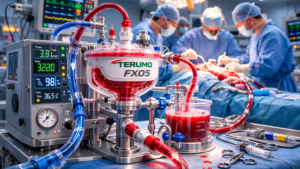Background: Patients with refractory cardiogenic shock (CS) necessitating peripheral veno-arterial extracorporeal membrane oxygenation (VA-ECMO) often require an intra-aortic balloon pump (IABP) or Impella for unloading; however, comparative effectiveness data are currently lacking.Methods and Results: Using Diagnosis Procedure Combination data from approximately 1,200 Japanese acute care hospitals (April 2018-March 2022), we identified 940 patients aged ≥18 years with CS necessitating peripheral VA-ECMO along with IABP (ECMO-IABP; n=801) or Impella (ECPella; n=139) within 48 h of admission. Propensity score matching (126 pairs) indicated comparable in-hospital mortality between the ECPella and ECMO-IABP groups (50.8% vs. 50.0%, respectively; P=1.000). However, the ECPella cohort was on mechanical ventilator support for longer (median [interquartile range] 11.5 [5.0-20.8] vs. 9.0 [4.0-16.8] days; P=0.008) and had a longer hospital stay (median [interquartile range] 32.5 [12.0-59.0] vs. 23.0 [6.3-43.0] days; P=0.017) than the ECMO-IABP cohort. In addition, medical costs were higher for the ECPella than ECMO-IABP group (median [interquartile range] 9.09 [7.20-12.20] vs. 5.23 [3.41-7.00] million Japanese yen; P<0.001).
Conclusions: Our nationwide study could not demonstrate compelling evidence to support the superior efficacy of Impella over IABP in reducing in-hospital mortality among patients with CS necessitating VA-ECMO. Further investigations are imperative to determine the clinical situations in which the potential effect of Impella can be maximized.
Keywords: Cardiogenic shock; Impella; In-hospital mortality; Intra-aortic balloon pump; Veno-arterial extracorporeal membrane oxygenation.







